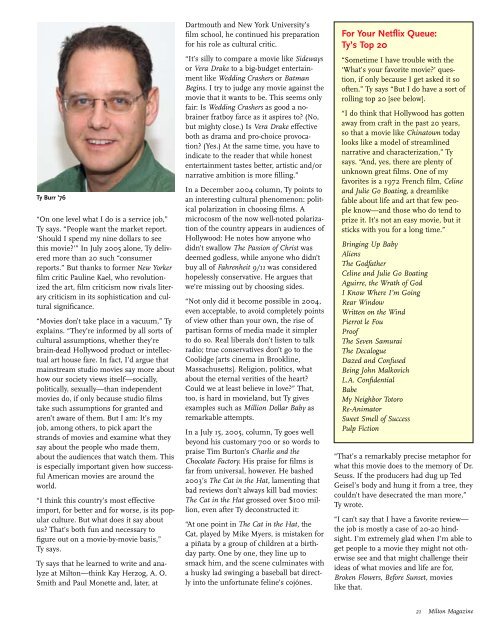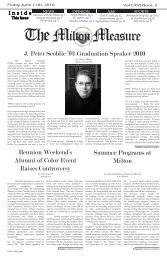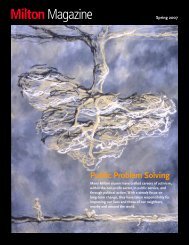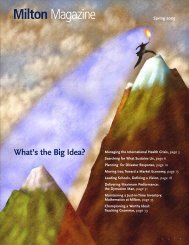While at the Paris Review, Jeanne publishedthe early stories of many youngwriters of her generation, including JeffreyEugenides, Susan Minot, Nancy Lemann,and Jay McInerny, while enjoying thesalon of George Plimpton at his height ofcultural importance.Her path to the Paris Review and beyond isone that most aspirant writers only dreamof: honors at Brown University, followedby an interview with former Vogue featureseditor Leo Lerman (known for alwayswearing purple). “Leo said to me, ‘I have afeeling about you,’” Jeanne recalls and hehanded her a job as a Condé Nast rover—meaning that she helped out at whateverpublication needed it at the moment—organizing shoes for a photo shoot at Self,for instance. Shortly after, Lerman movedJeanne to features assistant, which allowedher to write short pieces as well as edit.Throughout her career, she’s enjoyed thegood fortune of great mentors, she says.Lerman also sent Jeanne to film screenings,to try out new restaurants and to literaryevents, opening wide New York’scultural and social world to a 23-year-oldyoung woman. At 24, Jeanne’s next breakcame when Vogue editor Amy Gross, noweditor of O, The Oprah Winfrey Magazine,asked her to write one in a series ofwomen’s essays. “I was 24, and suddenlyI had clips,” Jeanne says. After graduateschool in English literature at Columbia,Jeanne, who had long been interested inthe more literary side of publishing, interviewedwith the late George Plimpton,actor-writer, and editor and cofounder ofthe Paris Review, which he devoted to findingunknown authors and running interviewswith authors such as ErnestHemingway.“During my interview, I told George thatto me this job would feel like being in asandbox with all the best toys.” Plimpton,noted for his sense of childlike adventurousness,appreciated the sentiment, andJeanne moved from the world of glossymagazines to a new workspace: Plimpton’sbasement.As managing editor at Paris Review for fiveyears and editor at large for another five,Jeanne calls those days working at “a specialplace at a special time.” She interviewedplaywright Sam Shepard andbecame great friends with novelist MonaSimpson. And Plimpton was always near,helping the Paris Review staffers—and theworld—look at the world upside down andsideways.“Crazy extracurricular events kept happeningthere. When George was writing hisnovel on Sidd Finch, the fictional baseballplayer, the plot called for someone to dropa ball from a blimp to the ground to clockhow fast Finch could throw. George wantedto go up in a blimp and describe whatit felt like, what the dashboard looked like,how it landed, et cetera. He invited usalong,” Jeanne says. And then there werethe drinks with the Dead: “George camein one day and said, ‘I met the GratefulDead backstage after their concert lastnight, and they are all coming over for adrink.’” When Plimpton wanted piecesfrom the “Writers at Work” series to beonline free of charge, he spoke of “the guyin Bangladesh” who might want to readthem. He asked his editors to appreciategood writing even if it wasn’t in their ownstyle or voice.Jeanne left the Paris Review to focus onwriting rather than intense editing work.She then began teaching fiction-writing atthe New School in New York. In 1998,publisher Win McCormack called Jeannefrom Portland, Oregon, wanting heradvice in how to start a literary magazine,Tin House. “I wasn’t interested at that timein doing another lit magazine; instead,Win hired one of my colleagues, ElissaSchappell, and her husband, RobSpillman, to do the job. I went on ascontributing editor to Tin House.”A few years later, when Jeanne was on bedrest while pregnant with her second child,she got a call from Tin House to edit anespecially tough 80-page interview withEdward Said, after which she joined thestaff more formally as a senior editor.Karen Rinaldi, editorial director ofBloomsbury Publishing and a longtimefriend, helped Jeanne establish a TinHouse book imprint at Bloomsbury. Underthat imprint, Jeanne first edited a fulllengthmemoir by AJ Albany, daughter ofJoe Albany, jazz musician, a father ofbebop and a drug addict.Now, Jeanne has just finished a book ofher own—a novel—and she’s at work onan oral biography of George Plimpton,whom she credits with teaching her to editan interview. He also taught her, she says,to be a good listener and to get writers andothers to talk about their craft. “Fictionwriters work in mysterious ways,” shesays, recalling that E.L. Doctorow conceivedof Ragtime as he stared intensely atthe wall of a house, considering the erawhen it had been built. On the oppositeside of the desk, Jeanne talks of editing asdeveloping the ability to see the sculpturewithin the big, rough block.Jeanne’s favorite magazines are The NewYorker, Granta, Tin House, Harper’s and theParis Review. She thinks that the big problemfor small circulations, even thoughthe readership is generally committed, isthat their publication is often reliant ongrants or university funding. “I would call[literary magazines] a triumph of idealismover commerce,” she says.When Jeanne wrote the piece on successfor Vogue shortly after graduating fromBrown, she contrasted her 24-year-oldself—toting manuscripts in her bag—withthe Jeanne of two years before, totingschool books. She talked about success asmeasured by enlightened women of the‘80s: friends, career and motherhood waydown the road.“I guess it was about how one little wordcould have so much meaning, so manydifferent meanings. What it really meansis that you’re fulfilling your dreams.”That idea of success has shifted throughoutJeanne’s career; her next possiblemoment of success will be hearing whatpublishers might be interested in her justcompletednovel: “It’s about becoming anadult, about reestablishing ‘home’ whenyou can’t go home again, or, to paraphraseElvis Costello, when home isn’t where itused to be,” Jeanne says.Ty Burr ’76Film CriticBoston GlobeBoston Globe film critic Ty Burr calls thelate 1960s and the 1970s the golden ageof film. Directors took chances and artisticvision was, of necessity, valued abovespecial effects. Remember that JohnSchlesinger’s Midnight Cowboy won anOscar for best picture, he says. Then alongcame Jaws and Star Wars, and the blockbusterwas born.20 <strong>Milton</strong> Magazine
Ty Burr ’76“On one level what I do is a service job,”Ty says. “People want the market report.‘Should I spend my nine dollars to seethis movie?’” In July <strong>2005</strong> alone, Ty deliveredmore than 20 such “consumerreports.” But thanks to former New Yorkerfilm critic Pauline Kael, who revolutionizedthe art, film criticism now rivals literarycriticism in its sophistication and culturalsignificance.“Movies don’t take place in a vacuum,” Tyexplains. “They’re informed by all sorts ofcultural assumptions, whether they’rebrain-dead Hollywood product or intellectualart house fare. In fact, I’d argue thatmainstream studio movies say more abouthow our society views itself—socially,politically, sexually—than independentmovies do, if only because studio filmstake such assumptions for granted andaren’t aware of them. But I am: It’s myjob, among others, to pick apart thestrands of movies and examine what theysay about the people who made them,about the audiences that watch them. Thisis especially important given how successfulAmerican movies are around theworld.“I think this country’s most effectiveimport, for better and for worse, is its popularculture. But what does it say aboutus? That’s both fun and necessary tofigure out on a movie-by-movie basis,”Ty says.Ty says that he learned to write and analyzeat <strong>Milton</strong>—think Kay Herzog, A. O.Smith and Paul Monette and, later, atDartmouth and New York University’sfilm school, he continued his preparationfor his role as cultural critic.“It’s silly to compare a movie like Sidewaysor Vera Drake to a big-budget entertainmentlike Wedding Crashers or BatmanBegins. I try to judge any movie against themovie that it wants to be. This seems onlyfair: Is Wedding Crashers as good a nobrainerfratboy farce as it aspires to? (No,but mighty close.) Is Vera Drake effectiveboth as drama and pro-choice provocation?(Yes.) At the same time, you have toindicate to the reader that while honestentertainment tastes better, artistic and/ornarrative ambition is more filling.”In a December 2004 column, Ty points toan interesting cultural phenomenon: politicalpolarization in choosing films. Amicrocosm of the now well-noted polarizationof the country appears in audiences ofHollywood: He notes how anyone whodidn’t swallow The Passion of Christ wasdeemed godless, while anyone who didn’tbuy all of Fahrenheit 9/11 was consideredhopelessly conservative. He argues thatwe’re missing out by choosing sides.“Not only did it become possible in 2004,even acceptable, to avoid completely pointsof view other than your own, the rise ofpartisan forms of media made it simplerto do so. Real liberals don’t listen to talkradio; true conservatives don’t go to theCoolidge [arts cinema in Brookline,Massachusetts]. Religion, politics, whatabout the eternal verities of the heart?Could we at least believe in love?” That,too, is hard in movieland, but Ty givesexamples such as Million Dollar Baby asremarkable attempts.In a July 15, <strong>2005</strong>, column, Ty goes wellbeyond his customary 700 or so words topraise Tim Burton’s Charlie and theChocolate Factory. His praise for films isfar from universal, however. He bashed2003’s The Cat in the Hat, lamenting thatbad reviews don’t always kill bad movies:The Cat in the Hat grossed over $100 million,even after Ty deconstructed it:“At one point in The Cat in the Hat, theCat, played by Mike Myers, is mistaken fora piñata by a group of children at a birthdayparty. One by one, they line up tosmack him, and the scene culminates witha husky lad swinging a baseball bat directlyinto the unfortunate feline’s cojónes.For Your Netflix Queue:Ty’s Top 20“Sometime I have trouble with the‘What’s your favorite movie?’ question,if only because I get asked it sooften.” Ty says “But I do have a sort ofrolling top 20 [see below].“I do think that Hollywood has gottenaway from craft in the past 20 years,so that a movie like Chinatown todaylooks like a model of streamlinednarrative and characterization,” Tysays. “And, yes, there are plenty ofunknown great films. One of myfavorites is a 1972 French film, Celineand Julie Go Boating, a dreamlikefable about life and art that few peopleknow—and those who do tend toprize it. It’s not an easy movie, but itsticks with you for a long time.”Bringing Up BabyAliensThe GodfatherCeline and Julie Go BoatingAguirre, the Wrath of GodI Know Where I’m GoingRear WindowWritten on the WindPierrot le FouProofThe Seven SamuraiThe DecalogueDazed and ConfusedBeing John MalkovichL.A. ConfidentialBabeMy Neighbor TotoroRe-AnimatorSweet Smell of SuccessPulp Fiction“That’s a remarkably precise metaphor forwhat this movie does to the memory of Dr.Seuss. If the producers had dug up TedGeisel’s body and hung it from a tree, theycouldn’t have desecrated the man more,”Ty wrote.“I can’t say that I have a favorite review—the job is mostly a case of 20-20 hindsight.I’m extremely glad when I’m able toget people to a movie they might not otherwisesee and that might challenge theirideas of what movies and life are for,Broken Flowers, Before Sunset, movieslike that.21 <strong>Milton</strong> Magazine
- Page 3 and 4: 283440Journalism at Milton24 Studen
- Page 6 and 7: One piece of AOL programming that h
- Page 8 and 9: puter) and read a piece. Bored? Pro
- Page 10 and 11: decrease in the amount spent on res
- Page 12 and 13: “The biggest change is corporatei
- Page 14 and 15: Jesse Sarles ’93“It’s a flexi
- Page 16 and 17: Felicia Taylor ’82Ned Roberts ’
- Page 18: “I don’t go through a lot of me
- Page 21: This summer, Peter was in the midst
- Page 25 and 26: Later, she enjoyed stints at Workin
- Page 27 and 28: were what to get into at Milton. Ma
- Page 29 and 30: Charlie Riggs, Abby Padien-Havens,
- Page 31 and 32: They say that the tough part was th
- Page 33 and 34: Co-editors of La Voz, 2005:Emma San
- Page 35 and 36: In its three to four annual issues,
- Page 37 and 38: 6 Sam Minkoff ’06 andJamal Sabky
- Page 39 and 40: Student graduation speakers Tanner
- Page 41 and 42: The Robert L. Daley PrizeCreated by
- Page 43 and 44: 1 Llewellyn Howland ’552 Derick F
- Page 45 and 46: 11 Robin Robertson with the MiltonM
- Page 47 and 48: The Head of SchoolMilton’s Magazi
- Page 49 and 50: I began to inventory the sensations
- Page 51 and 52: Hadley Davis Rierson ’89speaking
- Page 53 and 54: Emmy Norris is a prowler for “cul
- Page 55 and 56: A collection of symbols, none more
- Page 57 and 58: Middle School Tackles Complex Probl
- Page 59 and 60: Gratwick Performersdents prior to t
- Page 61 and 62: He changed his mind, though,soon mo
- Page 63 and 64: Creating Cityscapes:Third-grade stu
- Page 65 and 66: New Roles for Milton Faculty Member
- Page 67 and 68: Hugh R. SilbaughUpper School Princi
- Page 69 and 70: Academy. Jorge was singularlyfocuse
- Page 71 and 72: There are many variations foreach s
- Page 73 and 74:
Class of 1950, front row (left to r
- Page 75 and 76:
Class of 1955, front row (left to r
- Page 77 and 78:
Class of 1980, holding banner (left
- Page 79 and 80:
Class of 1990, front row (left to r
- Page 81 and 82:
Class of 1995, front row (left to r
- Page 83 and 84:
Margaret Creighton WilliamsMargaret
- Page 85 and 86:
The Lexi Rudnitsky Poetry Projectsp
- Page 87 and 88:
Milton AcademyBoard of Trustees, 20
















